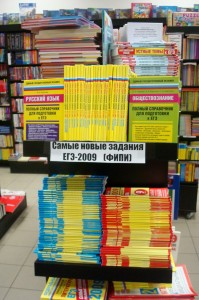ULYANOVSK, Russia | Almost all Russian soon-to-be graduates are trembling in the expectation of the looming date of 26 May. That is the “day of reckoning”, when their grasp of the various subjects they have been studying over the years will be verified by the so-called “Unified State Examination” (USE). 2009 graduates are the first cohort of students to undergo the obligatory test.
In the past, every Russian graduate wrote an essay on a literary topic, an exam on mathematics and three exams on elective subjects, which could be conducted in oral or written form. On top of that, when applying to universities, every applicant wrote additional preliminary exams as set by the institutes of higher education they applied to.
The experimental phase of the USE was introduced in 2001. Over the past 8 years, high school graduates have had the right to choose between the “classical examination process” and the USE. As of 2009, the USE is nation-wide and compulsory, and serves as the basic entrance examination for higher education.
The principal feature of the new examination process is its uniformity. No matter what part of the country students live in, everybody will be given the same test at the same level of difficulty. There are three main types of questions: multiple-choice, open-ended, and expand-answer questions, which are externally marked with the help of electronic technology and members of a special exam commission.
As the official USE web-portal states, every graduate is to pass two obligatory exams in Russian language and mathematics, and can choose between nine other subjects from the USE list. The choice depends on the requirements of the institute of higher education the graduate intends to apply to. If a student has no intention to go on to higher education, they are only required to write the tests in Russian language and mathematics.
It takes on average about 3 hours to write the various components of the exam. The least amount of time is assigned to the foreign languages section (142 minutes), and the longest (240 minutes) is reserved for literature and mathematics.
The obvious advantage of the USE is the elimination of subjective factors in students’ evaluations, like teachers and professors’ attitudes toward certain students. The USE aims to overcome these biases by employing an independent commission to mark the tests.
Moreover, some feel the test levels the playing field.
“Some technical universities in Moscow accept talented students on the basis of their participation in various all-Russian contests in mathematics, physics or other technical subjects. Many pupils, however, are not able to take part in these events [due to the distance or other personal factors]. Now every talented child has a chance to show his abilities when sitting the Unified State Exam. I support this innovation,” said Lyudmila K., the mother of an 18-year-old girl, who chose the USE as her preliminary university entrance examination last year and was admitted to the Moscow Institute of Physics and Technology, one of the best institutions in the country.
The USE official web-portal makes it possible for soon-to-be graduates to familiarize themselves with the exam ahead of time, and predict their chances of enrolling in a particular institution with the help of a special web questionnaire.
However, many students are not ready to accept such a radical change in the education system. “I personally believe that the combination of final exams and the university preliminary exams is a strong disadvantage, since we are given only one chance to pass the exams now,” argued Igor O., 16, who is graduating this year. Indeed, it was standard practice for universities to examine two “flows” of matriculates in the past. Those who failed their preliminary exams could try their best in the second “flow” several weeks later. The USE means that everyone only has one shot at being accepted now.
“I must admit, though, there is a greater incentive to study hard now,” Igor added as an afterthought.
According to many young people, another drawback of the USE is the fact that it devalues students’ personal qualities and their participation in various academic contests over the years. Nevertheless, education officials assure that a students’ achievements will not be overlooked in the admissions process: if two pupils receive the same number of points on the USE, the one with more personal achievements stands a better chance of being admitted.
Students also point to a discrepancy between the current school curriculum and the new USE requirements. “The old examination system is inconvenient, it’s true. But the new USE system remains underdeveloped, therefore it has many drawbacks,” argued Kseniya Biryukova, 16.
Many seniors say they have been forced to turn to expensive private tutors in order to upgrade their knowledge to the level required by the exam. “I have more tutors than there are days in a week! It seems to me that some mega-experiment is being conducted testing the endurance of students. However, I have to say that, in general, the idea is not bad. The problem is the constant nerve-racking preparation,” said Olga Shestova, 17.
The Ministry of Education of the Ulyanovsk region has tried to soothe students’ fears by offering them a trial run of the exam. Several “rehearsal exams” were conducted, including three exams on Russian language, foreign language and mathematics, in March and April of this year.
Only after 19 June, the last day of the USE exams for 2009, will Russian graduates able to relax. Until then, they are deciding whether the exam is a positive innovation or a form of cruel and unusual torture.

